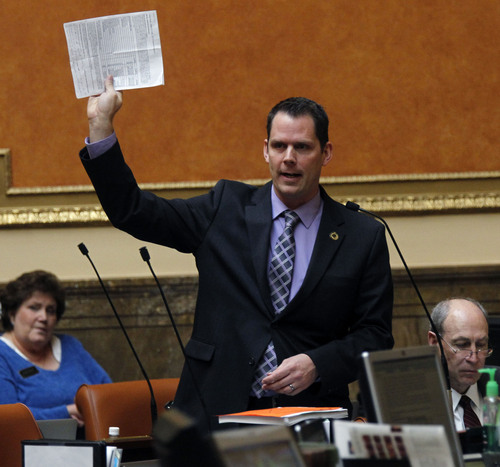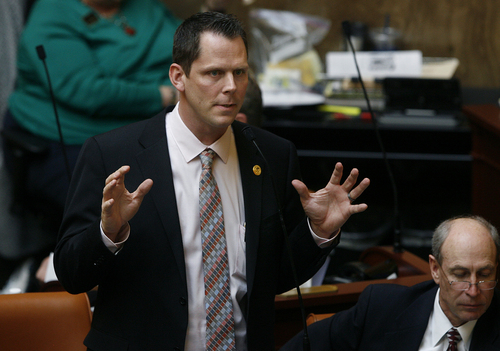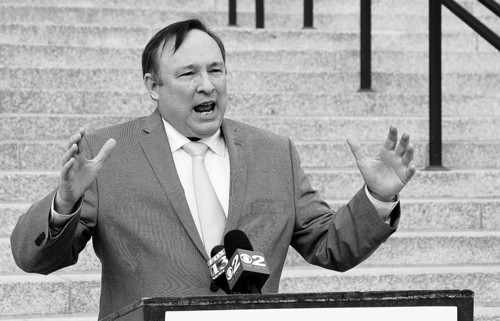This is an archived article that was published on sltrib.com in 2013, and information in the article may be outdated. It is provided only for personal research purposes and may not be reprinted.
After a federal judge struck down a Utah constitutional amendment that banned same-sex marriage, legislators are about to consider asking Utahns to vote on another amendment — this one seeking to ensure that churches cannot be forced to participate in marriages that violate their religious views.
"The truth is, the main reason I'm proposing this is that I just want people to relax" and to cool heated rhetoric after the same-sex marriage ban was overturned, says Rep. Jacob Anderegg, R-Lehi, the amendment's sponsor. "If they know they have their federal religious guarantees in writing, I hope they will just relax."
Even Sen. Jim Dabakis, D-Salt Lake City, who is gay and was married after the ban was struck down, does not oppose the idea. "I don't think anybody wants to be married by somebody that doesn't want to marry them," he said, adding it could help end worries and fighting.
However, Dabakis says he would support the amendment only if it were changed to require a civil marriage first for everyone, followed by a possible religious ceremony to help make clear that "civil marriage is a constitutional right."
—
Timing • Anderegg said he made his proposed amendment, HJR1, public online the day before Judge Robert J. Shelby rejected Utah's same-sex marriage ban created by Amendment 3 in 2004, and a few days after Judge Clark Waddoups ordered decriminalizing polygamy.
Anderegg said his legislation is not in reaction to those court rulings and that he has been working on it for more than year. He said he had a draft written last year that he did not introduce because he figured then that it would not have enough interest to pass, but the rulings have changed that.
"We'll see if it sprouts legs and walks in this session," he said, "or runs."
Anderegg said he started working on the proposal because federal courts seemed increasingly to be using the U.S. Constitution's 14th Amendment guarantee of equal protection under the law to trump the 10th Amendment's protection of state rights on marriage.
He figures tests will come eventually over whether the 14th Amendment can also trump the First Amendment's protection of religious liberty on marriage.
"Like [hockey star] Wayne Gretzky said, 'A good hockey player plays where the puck is. A great hockey player plays where the puck is going to be,' " Anderegg said. "I think this is where the law is going and want to put some extra protection in place."
He is also writing, but has not yet made public, a simple statute aiming to do the same thing as his proposed constitutional amendment. He said they may run in tandem, or one instead of the other, depending on support.
Anderegg says some conservatives have told him his amendment is not needed because the First Amendment already guarantees religious freedom.
—
Expanding exemption • On the other hand, he also has been told that some lawmakers may try to expand his amendment beyond covering just clergy and churches to also seek protection for commercial enterprises that do not want to participate in same-sex weddings, noting that some wedding photographers and cake makers have been sued in other states.
Dabakis said he would strongly oppose such an expansion. "That is about public accommodation. Do we want to go back to the day when somebody goes into a public business but [the owner] decides that African-Americans are inferior and it is their right not to provide them service?"
Bill Duncan, director of the national Marriage Law Foundation based in Lehi, said, "Maybe that's a signal he [Dabakis] doesn't believe the amendment will actually accomplish anything of any significance" if it focuses only on churches and clergy.
Duncan said while such a narrow amendment is "a good first step," he believes it should be expanded to business people who don't want to be forced to participate in something that violates their religious beliefs "because that is where legal challenges are most likely to come" — and already have — and where protection is needed the most.
Anderegg said he has heard of five other marriage bills in early stages of discussion by state legislators, but added he is not at liberty to talk about their contents or sponsors yet. He expects marriage to be a hot topic when the Legislature convenes next month.
Anderegg said a key to his legislation may be whether the Salt Lake City-based LDS Church takes a stand on it or any other bills. He notes he believes his amendment mirrors current church policy.
—
Memo to LDS bishops • The LDS Church this month sent to its bishops in Utah — who legally may officiate at weddings — a statement after the same-sex ruling reminding them about its position on such marriages.
"The First Amendment of the U.S. Constitution does not require ministers to perform marriages that are contrary to their faith," it said. "The doctrine of The Church of Jesus Christ of Latter-day Saints holds that marriage is between a man and a woman. Consistent with that fundamental belief, the church does not perform marriages between two people of the same sex."
It adds, "Church policy also precludes the use of church meetinghouses or properties for ceremonies, receptions, or other events associated with same-sex marriage. God loves all of his children and the church respects those with different opinions but its position on marriage is clear and unchanging."
Anderegg's proposed amendment says, "No religious organization, association, or society and no individual acting in a role connected with a religious organization, association, or society, may be required or compelled to solemnize, officiate in, or recognize a marriage or religious rite of marriage in violation of their right of conscience or their free exercise of religion."
Proposed constitutional amendment
"No religious organization, association, or society and no individual acting in a role connected with a religious organization, association, or society, may be required or compelled to solemnize, officiate in, or recognize a marriage or religious rite of marriage in violation of their right of conscience or their free exercise of religion."







